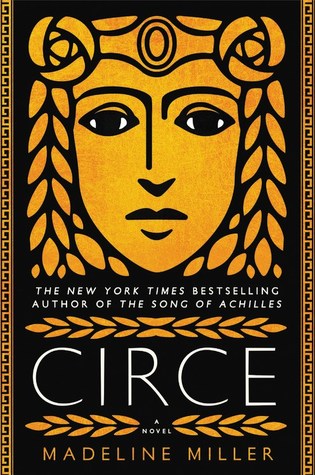Good Reads meta-data is rating 4.4/5 from 10127 litizens. 352 pages.
Verdict? Marvellous.

Circe is a daughter of Helios, a Titan. Sounds better than it is.
The Greek world is full of gods in a bewildering array of statuses, ranks, powers, egos, and so on. Zeus defeated the Titans and most were destroyed in the Divine War. Only the most essential, like Helios, survived. He is one of the most important remaining Titans but no Titan is important among the Olympians. Over the eons he has sired many children. Every deity is important to mortals. Some are gods, some are demi-gods, some are titans, some are nymphs, some are mortals, some are half-animal, and so on and on. This is a family tree for the LDS to sort out.
The book is a biography of one such child, Circe. Though ageless and immortal, she changes over time from a sulking metaphorical teenager trying and failing to win the approval of her aloof father to become a witch with witch’s brews. She and Flavia, whose books are reviewed elsewhere on this blog, would make quite a pair.
While immature in her father’s house, she transgressed by giving wine to a suffering Prometheus before he was sent to Alcatraz. For this sin she was exiled to an island dot far away to pass eternity alone with pigs. Later clever Circe finds a way to blackmail Helios with her sin.
Over the centuries in this insular retreat she meets passers-by, and she learns of the mortal world from these experiences. For a time she is befriended by Hermes, though he does so only for his own amusement and when no longer amused he is no longer friend.
None of the echelons of the immortals will have anything to do with this outcast, apart from Hermes who is partly spying on her for Helios, and so she takes an interest in the mortals who find the shore. She welcomes some, careful to keep her yellow eyes concealed for they declare the godhead, and regrets it.

One betrays her trust. Another rapes her before she can utter a spell, but she takes revenge by increasing the population of the sty.
Thereafter, she is much more cautious. Then one day wily Odysseus comes and she finds she cannot, nor does she want to deceive this deceiver. What a fresh and vivid portrait of this marriage springs from the pages. Marvellous. Yes, the story is well known but this is a telling Homer would envy.
Finally he leaves, not knowing that she is bearing his child, a son. This is a circle that closes in the remainder of the book.
With the great learning that underlies the book, the author explains much. One example will suffice. Why are the gods so capricious with mortals? Think about it. If mortal life was easy, then mortals would have no reason to pray to the gods and make sacrifices. While the gods do not need these prayers and sacrifices in any material way, together these offerings are how the divinities establish status (along with their powers) among themselves. They are counters in the social snobbery of the Olympians, nothing more. But since the gods have no other pastime but that snobbery, it is the only game in town.
The worse the harvest, it follows there will be more the prayers and sacrifices. The more children and women who die in childbirth, the more the prayers and sacrifices. Of course, to keep the wheel spinning the gods must occasionally allow a good harvest, and for child and mother to survive birth. But only now and then when it pleases them. Sounds about how casinos work, come to think of it.
Odysseus did in time return to rocky Ithaca, but as with many a war veteran, the man who came back was not the one who went away. He is changed. That change is the dynamic of the latter part of the book. He returns short-tempered, easily bored, lustful, violent, and voting Republican. Yet in some ways he is what he always was. This schizoid duality makes sense in these pages. Penelope plays her part, too.
 Madeline Miller
Madeline Miller
The author brings this world of the gods to life with razor sharp insights, exhilarating prose, penetrating details, and a profound compassion. Yet no punches are pulled. None. The violence rips the page. The arrogance of the gods burns the eye of the reader. The duplicity of mortals in this world is bottomless. All this is true, yet Circe delights in spring flowers and warm sand underfoot. Penelope abides. Telemachus is straight as an oak.
Her earlier book ‘The Song of Achilles’ is reviewed elsewhere on this blog with the same acclaim.
While pulling these remarks together I noticed a number of deprecating reviews, many of them video, by mouth-breathers (in Jim Rockford’s phrase). It was amusing to watch a couple of these pygmies.
Skip to content
